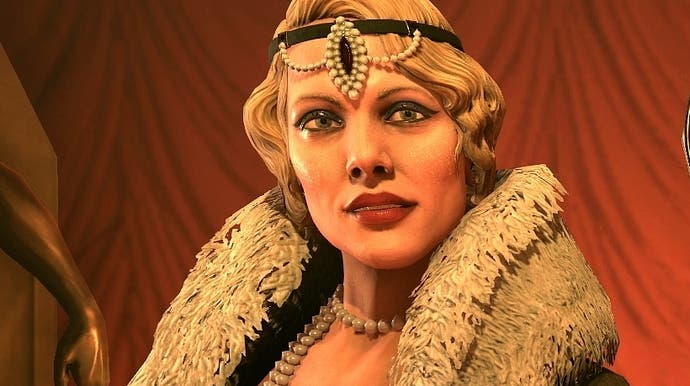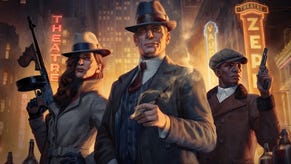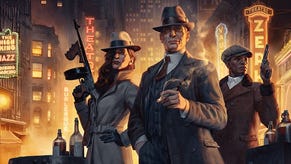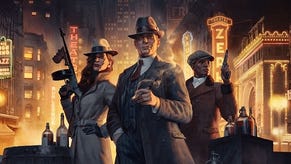Empire of Sin - enjoying the many layers of an American gangster cake
Whoopie.
I had the chance to play Brenda Romero's new gangster game Empire of Sin for five hours the other day and learnt a number of things about it.
I learnt that it's a game about moving up and down through layers. That's why it's hard to call Empire of Sin any one thing. Sometimes it looks like an RPG, sometimes it looks like XCOM, sometimes it looks like Civilization, and I'm sure at one point it even looked like Monopoly, the view zoomed so far out the buildings looked like plastic miniatures. But I can't call it any one of those things because the charm lies in Empire of Sin being all of those things.
It's a game where at one moment you can be running your team around the streets, like you would in an RPG, ticking off quests in your journal, talking to characters, playing with character builds, swapping equipment out. And then in the next moment you can be up in the clouds looking down on the neighbourhood and mapping out your turf.
Then, you're diving into the menus, managing what you've got. How many breweries do you have and what is their production like? Can you change the alcohol there? How alluring are your speakeasies, your brothels, your casinos and hotels? How well protected are they? There are pie charts, summaries of ins-and-outs, detailed breakdowns.
Then, you're having a cinematic sitdown with another crime boss. You're either behind the desk, like Don Corleone in The Godfather, or sitting facing it like a naughty school child, camera switching between you as you make your dialogue decisions. How dare you knock off one of my rackets? How dare you talk to me like that? Fuck you! Yeah, well fuck you too!
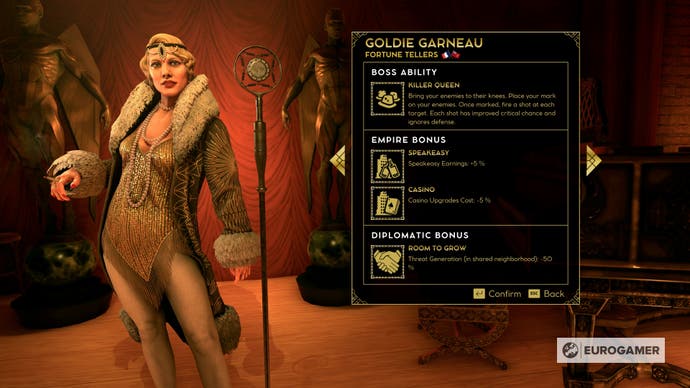
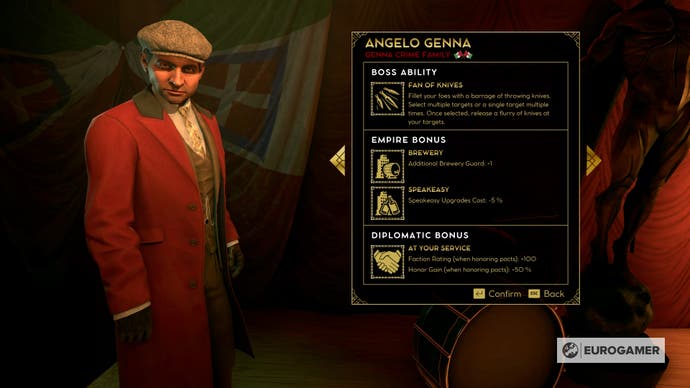
Negotiations broken, you're into XCOM turn-based combat, but still inside the HQ you were arguing in, now seeing it from a different view. There's a turn order, action points, and running from cover to cover, trying to find a clear shot while not getting shot yourself. Win and the HQ is yours, and the gang you're fighting will be no more. You will have chopped the head off the snake. But lose and it's game over for you too.
I like this layer-hopping because it scratches an itch I get playing games with more rigid approaches. In Civilization, I might think, 'Wouldn't it be cool to go inside these buildings and see what they're like, walk around and see what I own?' And in Empire of Sin, I can.
I can walk into any one of my rackets and see them in action, people going about their business. I can talk to them, have a drink. I can even watch the businesses change before my eyes as I pour money into them, improving the decor or bulking up the number of guards on duty there.
Similarly, I can push relationships further with my team of gangsters. I can get to know them in the way I would an RPG, even go on personalised loyalty quests for them, and promote them within my crime family if I like. Or, I can do what I dream of in RPGs, and own the towns I walk around. And not just one building: the whole damn thing.
These layers alone aren't anything particularly special, nor more detailed than you've seen them in other games before, but they compliment and fulfil each other in a way I've never seen before.
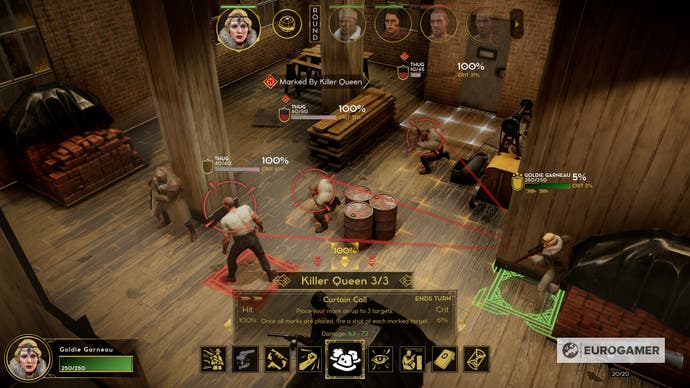
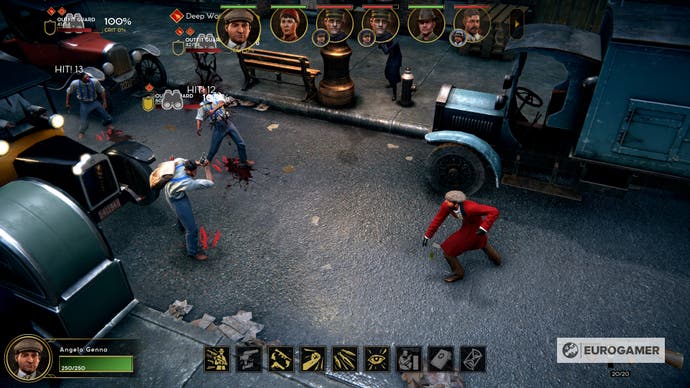
I also learnt that Empire of Sin has a playful heart. It's a game that enjoys the legends of Prohibition America as much as the history it's based on, and is the better for it. It has a charm, a cheek, and I can't tell you how refreshing it is to hear jaunty jaz in the background while you're shooting a place up.
It reminds me, this larger than life approach, of Civilization, and how the figures from history are handled there: in a slightly caricatured way, but still broadly authentic. This is most apparent in boss abilities, which are overpowered super-attacks. Each boss has one.
When I was Angelo "Bloody" Genna, for instance - a real figure from history - I could fling knives like Gordon Ramsey in a dirty kitchen. Could Genna do this in real life? No of course not, but it's fun in the game. Other bosses do things like swing baseball bats at heads like they're hitting home runs, blow hallucinogenic powder into enemies' faces to mind-control them, and shoot wonder-bullets that can ricochet around every enemy in the room. Realistic? Does it matter?
There's a bit of rule-bending concerning the bosses themselves, too. One of them is actually John Romero's great grandmother! She's Elvira Duarte, and though she didn't exist in Chicago in the 1920s, she did exist down in Mexico around the same time, and by all accounts was a bit of a gangster herself. Brenda Romero wrote to John's aunt to find out more. "And the letter we got back was like, holy shit," she tells me.
"So, [Elvira] owned multiple brothels. She had bars. And then at one point, she wins the lottery and decides to go straight. She sells all that sort of stuff up, and with her money she builds a chapel to herself. She starts taking kids in from all over the place. She also used to eat rattlesnake meat. She was feared and loved. It's unbelievably fantastic."
So Romero moved Elvira up to Chicago. It helped bring a bit more diversity to the game's palette, something very important to Romero. It's why they pulled real-life gambler Stephanie St. Clair over from New York, and why they created fictional boss Goldie Garneau, too.
Another thing I learnt is there's more nuance to Empire of Sin than can be experienced in five hours. Of course there is. Here's a game like Civilization Revolution (I use Revolution because it's more streamlined than a dense, traditional Civ game) where you pick a faction - a boss in Empire's case - and try to complete the game with them. Try to take over Chicago. I didn't even take over a neighbourhood, let alone 10 of them. How can I expect to grasp the nuances of strategy in five hours?
My experience was actually fairly one-note. Mostly, I ran down the street with my team, finding buildings I could attack and therefore take over. Attacking them takes you inside the building and puts you in turn-based combat mode, as the game does when any combat kicks up. Incidentally, combat can feel a bit fiddly and sluggish. Sometimes I'd struggle to select places to move to, and it'd take a while for fights to play out. I'd love to see it sped up a bit, respond more crisply, and behave with a bit more clarity. But there is acknowledged fine-tuning to do.
Then, presuming you're successful in combat, you decide what happens to the building you attacked. If it's already a racket, you can keep it as it is, simply taking it over, otherwise you need to pay to make it one, or smash the place up. Rinse, repeat.
Even when I jumped save to Goldie Garneau, in the mid-game, I did much the same thing, though she already had dozens of business and a weekly income in the positive. But still I seemed to be following a routine of finding a building to take over and then adding it to my pile. Quantity over quality, it seemed.
It wasn't until, flush with confidence, I decided to declare war on Angelo Genna's HQ, and got my arse handed to me, I realised I'd butted up against the learning curve in the game. I would have to look again. My team wasn't well equipped enough, they'd all need better guns. My team also wasn't big enough; I had four people but I could have had, apparently, 10. But I'd need higher notoriety to hire other gangsters in.
And my empire, though it was bigger, was still not providing enough. And was it balanced? When speaking to Romero Games after I played, I realised I'd not paid any attention to creating synergies between the buildings I owned. I could have had Three of a Kind, Straight, Full House - do you see where this is going? And if I stuck a hotel nearby, it would turbo-charged them all, my door people effectively funneling guests to my rackets.
Nor did I realise I had to tailor alcohol types to match neighbourhood prosperity levels, and that I could mess up other neighbourhood's prosperity levels by shooting them up. And because I didn't venture too far, I didn't get a feel for gang alliances or group-declared wars, or anything like that.
So you're beginning to see, I hope, there's a lot more to Empire of Sin than maybe meets the eye. Brenda Romero describes it as a "system soup" and I love the description. You control the ingredients. You fling them in and stir them around and every time you pour a bowl of something new. That's the plan. And we don't have long to wait for a taste.
Empire of Sin releases 1st December on PC, PS4, Xbox One and Switch. It'll also run on PlayStation 5 and Xbox Series S/X.
